The dwindling of juan cun (眷村), or military dependents’ villages, has recently become an inspiration for many artistic endeavors.
Television producer Wang Wei-chung’s (王偉忠) successful television drama The Story of Time (光陰的故事) and sold-out theatrical production The Village (寶島一村) are two examples that immediately come to mind.
Now the disappearing culture of veterans’ communities has been translated onto the silver screen by local filmmakers eyeing both the past and present. Seasoned director Lee You-ning’s (李祐寧) Four Hands (麵引子), which hit local cinemas earlier this month, is an historical melodrama that deals with a Chinese Nationalist army veteran who goes back to China to visit what’s left of his family. Mostly set in the atmospheric Treasure Hill Artist Village (寶藏巖國際藝術村), the film is nevertheless a lachrymose disappointment starring Wu Hsing-kuo (吳興國), who delivers an embarrassingly exaggerated performance.
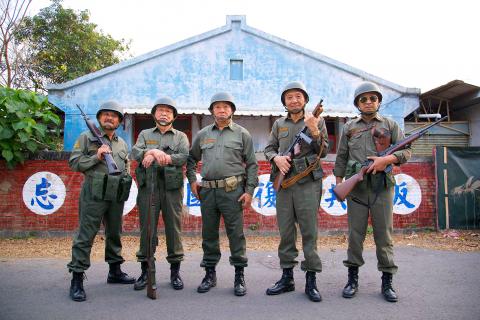
Photo Courtesy of Applause Entertainment
On a completely different note, War Game 229 (燃燒吧!歐吉桑), the feature debut by photographer and documentary filmmaker Huang Chien-liang (黃建亮), is a fast-paced movie whose action centers on airsoft games.
The main players in the film are five veterans who fled from China to Taiwan with Chinese Nationalist Party (KMT) troops in the late 1940s. After decades in a military residential compound, the aged veterans are the last holdouts and find themselves facing eviction. Meanwhile, members of a champion airsoft team find out about the place and make what they think is an abandoned village into a practice field.
Piqued by the intrusion, the five experienced soldiers decide to fight back and defend their home turf.
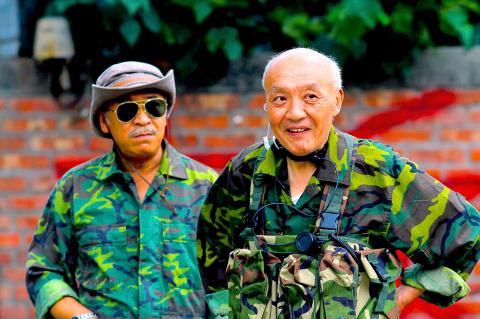
Photo Courtesy of Applause Entertainment
Attired in genre trappings, the film revolves around the motif of home. To the veterans who retreated to Taiwan and now face a second relocation, home is never something taken for granted. The 20-somethings play combat games, but the former soldiers know too well that to lose a battle can mean losing your home.
Greatly supported by a fine cast of veteran actors who rarely make appearances in today’s television programs and movies, War Game 229 shows promise as an excellent work of entertainment. It gives the memory of the past a creative, new reading, showing that the heavy subject of history can also be approached with humor, action and excitement. Unfortunately, mediocre production values prevent the work from rising beyond the quality of television drama. War Game 229 has plenty of bright ideas, but its director chose to rush the story rather than allow space for the ideas to evolve.
A final blow comes in the form of feeble performances by young pop idols, including models-turned-actors Tender Huang (黃騰浩) and Jenna Wang (王思平).
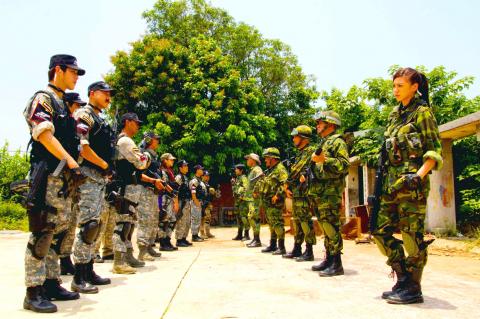
Photo Courtesy of Applause Entertainment
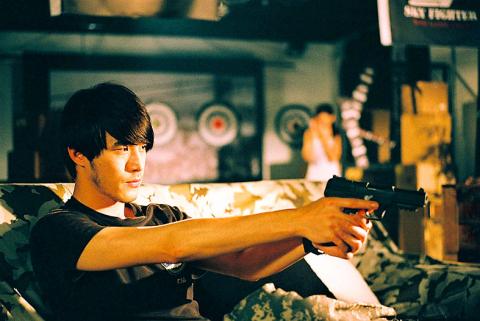
Photo Courtesy of Applause Entertainment
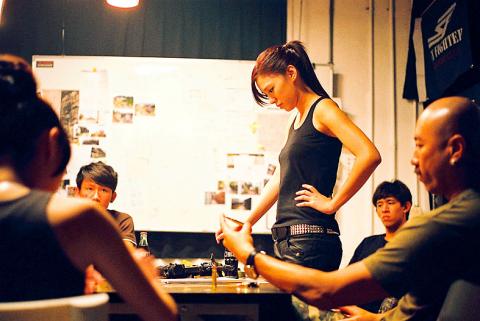
Photo Courtesy of Applause Entertainment

Mongolian influencer Anudari Daarya looks effortlessly glamorous and carefree in her social media posts — but the classically trained pianist’s road to acceptance as a transgender artist has been anything but easy. She is one of a growing number of Mongolian LGBTQ youth challenging stereotypes and fighting for acceptance through media representation in the socially conservative country. LGBTQ Mongolians often hide their identities from their employers and colleagues for fear of discrimination, with a survey by the non-profit LGBT Centre Mongolia showing that only 20 percent of people felt comfortable coming out at work. Daarya, 25, said she has faced discrimination since she

April 21 to April 27 Hsieh Er’s (謝娥) political fortunes were rising fast after she got out of jail and joined the Chinese Nationalist Party (KMT) in December 1945. Not only did she hold key positions in various committees, she was elected the only woman on the Taipei City Council and headed to Nanjing in 1946 as the sole Taiwanese female representative to the National Constituent Assembly. With the support of first lady Soong May-ling (宋美齡), she started the Taipei Women’s Association and Taiwan Provincial Women’s Association, where she

It is one of the more remarkable facts of Taiwan history that it was never occupied or claimed by any of the numerous kingdoms of southern China — Han or otherwise — that lay just across the water from it. None of their brilliant ministers ever discovered that Taiwan was a “core interest” of the state whose annexation was “inevitable.” As Paul Kua notes in an excellent monograph laying out how the Portuguese gave Taiwan the name “Formosa,” the first Europeans to express an interest in occupying Taiwan were the Spanish. Tonio Andrade in his seminal work, How Taiwan Became Chinese,

More than 75 years after the publication of Nineteen Eighty-Four, the Orwellian phrase “Big Brother is watching you” has become so familiar to most of the Taiwanese public that even those who haven’t read the novel recognize it. That phrase has now been given a new look by amateur translator Tsiu Ing-sing (周盈成), who recently completed the first full Taiwanese translation of George Orwell’s dystopian classic. Tsiu — who completed the nearly 160,000-word project in his spare time over four years — said his goal was to “prove it possible” that foreign literature could be rendered in Taiwanese. The translation is part of